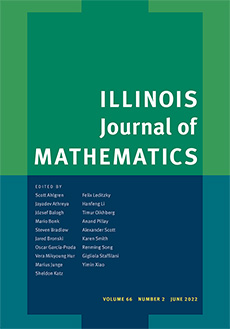Abstract
Let $m(\xi,\eta)$ be a bounded continuous function in $\mathbb{R}\times\mathbb{R}$, let $0< p_i,q_i<\infty$ for $i=1,2$, and let $0<p_3,q_3\le\infty$, be such that $1/p_1+1/p_2=1/p_3$. It is shown that
\[ C_m (f,g)(x)=\int_{\mathbb{R}} \int_{\mathbb{R}} \hat f(\xi) \hat g(\eta) m(\xi,\eta) e^{2\pi i x(\xi +\eta )}d\xi d\eta \]
is a bounded bilinear operator from $L^{p_1,q_1}(\mathbb{R})\times L^{p_2,q_2}(\mathbb{R})$ into $L^{p_3,q_3}(\mathbb{R})$ if and only if
\[ P_{D_{\varepsilon^{-1}}m} (f,g)(\theta)=\sum_{k\in \mathbb{Z}} \sum_{k'\in \mathbb{Z}} \hat f(k) \hat g(k') m(\varepsilon k, \varepsilon k') e^{2\pi i \theta(k +k' )} \]
are bounded bilinear operators from $L^{p_1,q_1}(\T)\times L^{p_2,q_2}(\T)$ into $L^{p_3,q_3}(\T)$ with norm bounded by a uniform constant for all $\epsilon >0$.
Citation
Oscar Blasco. Francisco Villarroya. "Transference of bilinear multiplier operators on Lorentz spaces." Illinois J. Math. 47 (4) 1327 - 1343, Winter 2003. https://doi.org/10.1215/ijm/1258138107
Information





